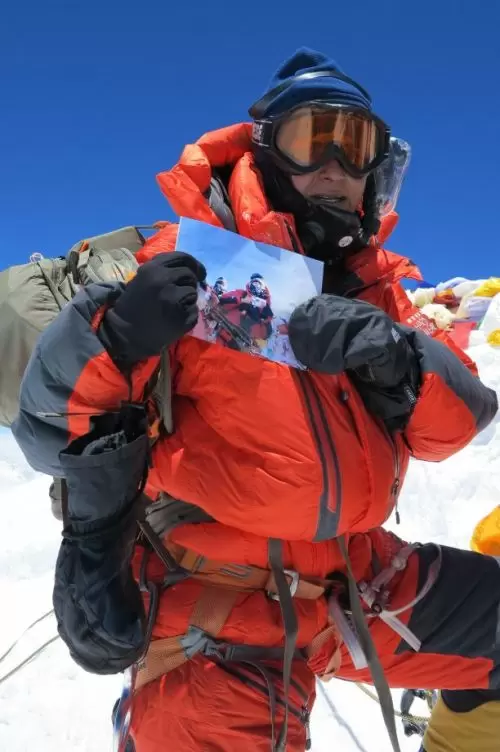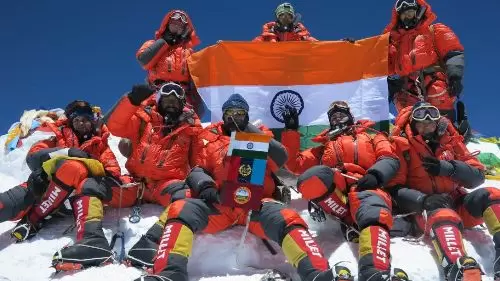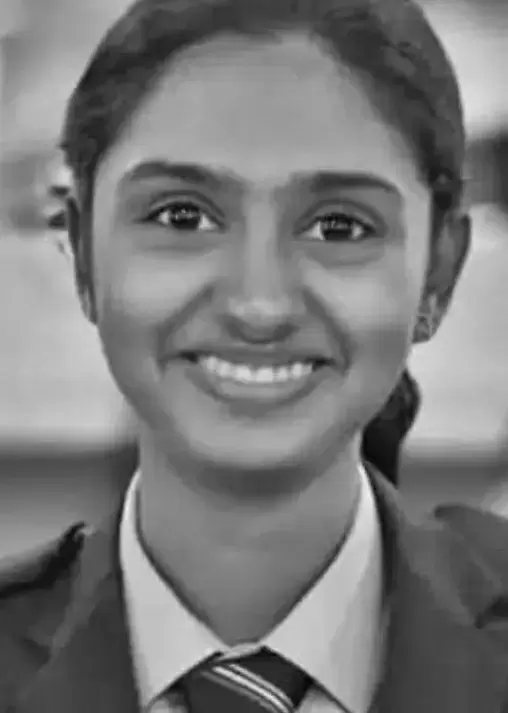“You do need physical strength for such expeditions but more than that you need mental strength”
Abha Sharma
| Jaipur
15-December-2016
Vol 7 | Issue 50
“It was serene and beautiful. As I sat alone at the highest peak awaiting my teammates, I was so overwhelmed that tears rolled down my cheeks. But I quickly wiped them and said to myself: ‘I should capture this moment and enjoy it’. In that hour I felt as if I was close to God.”
Tenacious, spirited, modest, athletic, fun-loving, warm… there are many words to describe Major Deepika Rathore, who recently became the only woman from Rajasthan – and perhaps from the Indian Army as well – to scale the mighty Everest for a second time, as part of the National Cadet Corps (NCC) first expedition of 10 girls between 19-21 years of age.
 |
|
Major Deepika Rathore became the only woman from Rajasthan - and perhaps from the Indian army as well - to scale the mighty Everest for a second time (Photos Courtesy: Maj. Rathore)
|
Although she belongs to a state where it’s common for girls to give up their dreams and settle for a life of quiet domesticity, Major Rathore, who hails from the valorous but conservative Rajput clan, is glad that she has been able to set an example that busts the myth “that girls are the weaker sex and thus not fit for great feats”.
At first glance Rathore looks like the typical girl-next-door, pretty and rather lean; there are no overt signs of her being a world-class mountaineer, athlete – she’s neither very tall nor very muscular.
So the obvious question that comes to mind: summiting the Everest is no ordinary feat; how did she manage it; where’s the hidden physical strength?
A smile lights up her face as she says, “Yes, you do need physical strength for such expeditions but more than that you need mental strength. It is the test of your indomitable courage and strong willpower to face the challenges and hurdles that come on the way.”
For Rathore going down memory lane is always an emotional experience – her eyes brighten as she talks about the long, tough journey she has traversed to pursue her passion for climbing.
“I come from a desert state so the mountains have always fascinated me. Exploring the treacherous slopes is exhilarating. To fulfil my dream of mountain climbing I signed up for the basic course at the Nehru Institute of Mountaineering (NIM), Uttarkashi, in 2002.
“These days, there is a lot of buzz around mountaineering as the media actively reports on it but when I wanted to pursue it nearly 15 years back there was hardly any awareness or information on it. In fact, no one in my family knew much, not even my father,” she shares.
Naturally, there was a lot of apprehension in the family when she told them about her plans. Indeed, the immediate reaction was what if she met with an accident during training, who would marry her then?
“All parents hope to find a good match and see their daughter settled in a happy marriage; mine were no different. But it was one of my father’s friends who supported my decision and convinced them to let me give it a try. He told them that accidents can happen even at home and it shouldn’t be the only reason they stop me from giving mountaineering a go,” she elaborates.
That was the turning point in her life. She still remembers the thrill she felt when she saw snow for the very first time. As time progressed her stint at NIM was useful and rewarding; she got good grades and went on to complete the advance course with flying colours.
Thereafter, she performed well in the expeditions as well. As luck would have it, in 2011 she also got married to Jitendra Singh Shekhawat, a merchant navy engineer, who has been backing her career ever since.
Shekhawat, who has flown in from Bangkok, where he is presently posted, to celebrate his wife’s recent feat, says, “Deepika joined the army because she loved the idea of being in the services and also wearing the uniform. Moreover, she simply loves adventure and the army provides opportunities therein.
“She was the captain of Delhi area adventure team and the only woman in the country to have taken part in Army Adventure Cup, which included 11 kilometres of motor biking, running and water rafting.
 |
|
To pursue her dream of mountain climbing, Rathore signed up for the basic course at the Nehru Institute of Mountaineering (NIM), Uttarkashi, in 2002
|
“We married in March 2011 and she was off for training in June to prepare for her first climb to the Everest. She was posted in the Leh Ladakh sector when she came to know of the All Army Everest Expedition.”
Adds Rathore, “Truly, life in the services provides one with many different opportunities. I love mountaineering and thanks to the army I have had the privilege of scaling the Mount Everest, not once but twice.”
Why scale Everest a second time? “Well, I had never thought I would get to go there again but I was approached to lead a batch of NCC girls. I have been a cadet myself and owe much to the training I got there so this was a chance to give back.
“In the first expedition, I had to explore and concentrate on my goal. However, this time it was far more challenging because I was aware of the dangers and I had the additional responsibility of mentoring a group of young cadets,” she explains.
This was NCC’s maiden expedition for which 10 girls from across India were selected after a rigorous test. The team received training at Siachen base camp. Incidentally, the team left Siachen just a day before the deadly avalanche in which many Indian soldiers, including Lance Naik Hanumanthappa Koppad, were buried alive.
News of the incident served as a reminder of the dangers of their mission. To keep their morale high Rathore told them, “If you feel you are strong, no one can stop you. If you think, you can. Brave soldiers like Hanumanthappa are a constant source of inspiration to us all.
As Rathore’s group undertook the tortuous journey up the great peak they faced many rough times and hardships. She elaborates, “We had taken the traditional route from Jiri to the base camp that was also tread by the legendary Tenzing Norgay and Sir Edmund Hillary.
“Apart from the physical distress, loss of appetite, and the load on the back - the physical instruments are heavy and even the shoes weigh almost five kilos - the high altitude sickness and the casualties one encounters on the way are enough to pull anyone down.
“For four days, I didn’t eat anything. I was only on water and energy drinks. One time we were scaling up smoothly and suddenly we saw a water bottle, then a bag and some other belongings, followed by dead bodies sliding down, including five Indians and one American woman. I told my group: ‘Salute the great mountaineers and move ahead.”
Back home, Rathore is pleased that they were able to realise their objective. Yet, she doesn’t think she would be going back there again. “I don’t think my family, including my husband, parents and in-laws, who have been super supportive till now, will be able to take the stress. They are the ones praying, wishing and spending restless moments till our safe return,” she remarks.
As she accepts rich praise and felicitations, the proud officer emphatically says, “If a girl gets the right opportunity, encouragement and support, the sky is the limit for her.” Rathore has certainly shown that for women the way forward only goes up. - Women's Feature Service
















